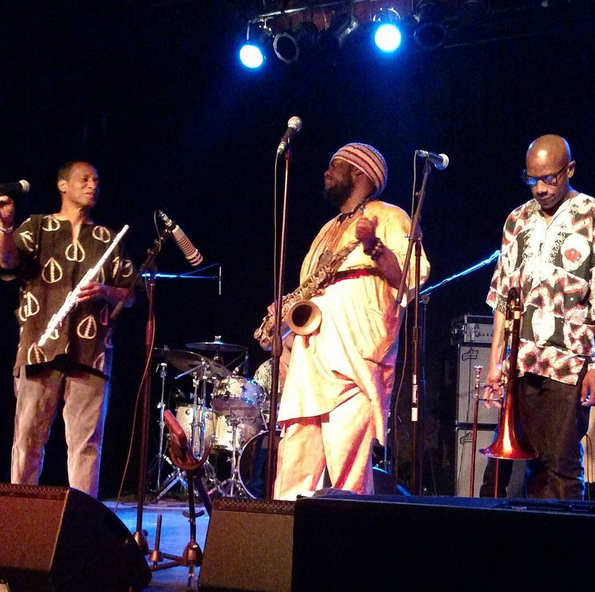Saxophonist, composer and arranger Kamasi Washington has been selling out venues around the country and being praised as the savior of American jazz. At The Orange Peel on Thursday, Washington and his band, The Next Step, proved they were worth the hype with their endearingly pure, powerful and technically jaw-dropping performance.
The opener was Moonchild, a jazz quartet locked deep into a neo-soul sound reminiscent of ’90s-era Erykah Badu and D’Angelo. Their easy jams perfectly primed the pump for the Next Step.
Washington and his band comprise much of the West Coast Get Down, a collective of musicians prominent in the LA music scene. Before his debut, The Epic, Washington was bestknown for his jazz arrangements on Kendrick Lamar’s To Pimp a Butterfly.
The song format for the show would have been familiar in a jazz club — introduction of theme, solo, recapitulation. Tracks from The Epic, tweaked slightly for the road, served as a launchpad for enormous fireworks of musicianship.
Pianist Cameron Graves began the friendly competition. Tearing a five-minute hole through the opening number, “Changing of the Guard,” Graves delightfully dragged both the band and audience through bop sequences, salsa riffs and Rachmaninoff-esque lower octave runs.
Not to be outdone, upright-bassist Miles Mosley huddled over the wooden body of his instrument, caressing otherworldly sounds through classical bowing technique, a full effects-pedal board, hard-won chops and a downright funky demeanor.
Vocalist Patrice Quinn seemed at home in the mountains of Western North Carolina, thrusting yoga mudras skyward and undulating the physical manifestation of her aural sensations. All this when she wasn’t conducting her own powerful energy work on the microphone.
The most powerful moment of the night came when Washington introduced his father to the stage. A promising mainstream musician in the 1970s, Rickey Washington decided to turn to the church instead, playing spiritual music and providing musical mentorship to children in the community, including his son (Kamasi still plays the Conn 6M alto saxophone his father gave him at age 12). Rickey sat in on flute for “Henrietta Our Hero,” a swinging ballad Kamasi wrote for his recently passed grandmother.
When Rickey stepped up to the mic to take his solo, the band quieted around him. One got the sense he had longed in the past for moments like this but, as a young father, had come to peace with a different way of life. The elder Washington closed his eyes and blew a breathy, moving meditation to his mother. After a night of flash and upstart ambition, the moment captivated with its wise, understated elegance.
Despite being the frontman, Kamasi exhibited great humility and deference to his friends onstage, stepping aside as they took their solos, nodding his head vigorously, smiling and hollering for them to go further. The warmth and costume of the band seemed reminiscent of Sun Ra Arkestra.
Kamasi has said in interviews there are, incredibly, eight other West Coast Get Down albums coming from the month-long 2011 recording session that produced The Epic. His fans are looking forward to hearing more.




Before you comment
The comments section is here to provide a platform for civil dialogue on the issues we face together as a local community. Xpress is committed to offering this platform for all voices, but when the tone of the discussion gets nasty or strays off topic, we believe many people choose not to participate. Xpress editors are determined to moderate comments to ensure a constructive interchange is maintained. All comments judged not to be in keeping with the spirit of civil discourse will be removed and repeat violators will be banned. See here for our terms of service. Thank you for being part of this effort to promote respectful discussion.